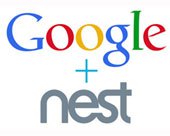Google pays $3.2 billion for Nest, a smart-home gadget maker
 Google just spent $3.2 billion on a fancy thermostat and smoke alarm maker called Nest.
Google just spent $3.2 billion on a fancy thermostat and smoke alarm maker called Nest.
That might not sound exciting, so let’s put it another way: Google has just bought itself a company that can serve as its hardware entrance into the internet of all things, which means that Big Google Brother will be able to know even more intimate things about us than it already does, such as, potentially, whether we’re home or not.
Google’s latest acquisition makes thermostats that learn, tracking customers’ daily usage to automatically set heating and cooling temperatures and thereby save on energy costs.
In addition, Nest’s smoke alarms communicate with the company’s other devices or with your smartphone or tablet via WiFi. If your smoke or carbon monoxide alarm goes off, you’ll get a message, wherever you are.
Privacy advocates are worried about Google getting its hands on data that could include such things as whether we’re home or not, which it could easily connect with our mobile phone data to form ever-more-deep portraits of us for ever-more-targeted advertising or other profit-rich ventures.
The concern comes in spite of Nest’s insistence that its customer data will be used only to improve its services.
To echo Brian Fung, writing for The Washington Post, we should ask, what will happen to Nest’s user data after the acquisition?
Nest’s data is now handled by Amazon Web Services, The New York Times’s Quentin Hardy reports, but buckle in: Google might well move to get the data onto its Compute Engine public cloud lickety-split.
And after all, surely Nest is in no position to rule out sharing its data with Google, given that Google could simply rewrite Nest’s privacy policy, pointed out David Jacobs, a consumer protection lawyer at the Electronic Privacy Information Center (EPIC).
In talking to the Washington Post, Jacobs noted that Google’s done it before:
Google has made several changes to its privacy policies and its business practices. Whenever it does, the message to consumers is, ‘You accept the changes or you use something else.’ There’s nothing really stopping the companies from changing their mind down the road and deciding to use it for advertising or something else.
And what will happen to existing Nest users? Will they be allowed to opt-out of sharing their information with Google, or will they have no choice?
Matt Rogers, Nest’s founder and vice president of engineering, blogged reassuringly to customers, saying that the company has “always taken privacy seriously and this will not change.”
Well, that would be nice. But remember who we’re talking about.
Google already has our personal data, and now it’s getting the chance to get at our home data – when we’re away, when we’ve had a fire and what our power bills amount to.
Article source: http://feedproxy.google.com/~r/nakedsecurity/~3/Mdiu9_GRE0o/